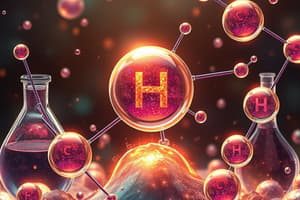Podcast
Questions and Answers
Define Chemistry.
Define Chemistry.
Chemistry is the study of the composition, properties, structure and reactions of matter, and the changes they undergo.
How is Chemistry the central science?
How is Chemistry the central science?
It connects physics with other natural sciences such as astronomy, geology, and biology.
How do Chemists communicate?
How do Chemists communicate?
The main study of Chemistry and how Chemists communicate information is the chemical reaction.
What separates Chemistry from the other sciences?
What separates Chemistry from the other sciences?
What are the 5 branches of Chemistry?
What are the 5 branches of Chemistry?
Name 7 fields of Chemistry.
Name 7 fields of Chemistry.
List the metalloids.
List the metalloids.
What arrangement does the 18 groups/family/column refer to?
What arrangement does the 18 groups/family/column refer to?
What arrangement does the 7 rows/periods refer to?
What arrangement does the 7 rows/periods refer to?
Flashcards are hidden until you start studying
Study Notes
Definition of Chemistry
- Chemistry is the study of matter's composition, properties, structure, reactions, and the changes it undergoes.
Chemistry as the Central Science
- Establishes connections between physics and natural sciences like astronomy, geology, and biology.
Communication in Chemistry
- Chemical reactions are the primary means through which chemists share and convey information.
Unique Aspect of Chemistry
- Synthesis distinguishes chemistry from other sciences, particularly physics and biology.
Branches of Chemistry
- Five main branches:
- Inorganic chemistry
- Organic chemistry
- Biochemistry
- Physical chemistry
- Analytical chemistry
Specialized Fields of Chemistry
- Cosmochemistry: study of the universe.
- Femptochemistry: examines fast chemical reactions on extremely short timescales.
- Oenology: focuses on the science of wine.
- Petrochemistry: studies petroleum and rocks.
- Phytochemistry: investigates chemicals in plants.
- Thermochemistry: revolves around the study of heat in chemical processes.
- Sonochemistry: explores the effects of sound on chemical systems.
Metalloids
- Key metalloids include:
- Silicon
- Germanium
- Arsenic
- Antimony
- Tellurium
Periodic Table Structure
- 18 groups (families or columns) run vertically (up and down).
- 7 rows (periods) run horizontally (left and right).
Studying That Suits You
Use AI to generate personalized quizzes and flashcards to suit your learning preferences.




